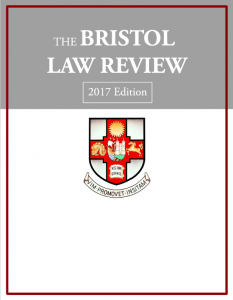By Miss Christina Chambers, Law Student (MA, 2017) and Editor-in-Chief of the Bristol Law Review for the 2017 Edition (University of Bristol Law School).
 The University of Bristol Law School is proud to announce the publication of this year’s edition of the Bristol Law Review, which is freely accessible at https://bristollawreview.co.uk/print/. The Law School Blog also warmly welcomes its Editor in Chief’s reflections on the importance of this project for our students and as an opportunity to further develop the Law School as a learning community.
The University of Bristol Law School is proud to announce the publication of this year’s edition of the Bristol Law Review, which is freely accessible at https://bristollawreview.co.uk/print/. The Law School Blog also warmly welcomes its Editor in Chief’s reflections on the importance of this project for our students and as an opportunity to further develop the Law School as a learning community.
It was my great privilege to be the Editor-in-Chief of the Bristol Law Review for the 2017 Edition. The Bristol Law Review represents a platform for exceptional students to showcase their writing and also provides a unique educational experience for its editors. As Dr Eirik Bjorge so rightly pointed out in the preface to this year’s Law Review, “[m]any of today’s law students strive first and foremost to be qualified for ‘jobs in the modern world’, and believe that the study of law in a university should be geared in the first instance towards learning just about enough successfully to answer four prepared questions in an examination.”
At times the pressure to consider a law degree as a means to an end is overwhelming. I am sure that there are a great number of students who would consider the process of spending hours reading, editing and critiquing the work of their peers to be some sort of punishment, but this is to ignore the great benefits that come with such an endeavor. Of course, there is the instant benefit of reading in great detail the best work that has been produced at all levels of study and incorporating the strongest elements of this into your own work. The feedback I received from the editorial board this year following their training session certainly attests to this! However, there is also the long term benefit of truly engaging with law as an academic pursuit, something that I believe is sometimes overlooked in the effort to simply make it through your degree.
In my first meeting with the Head of School before the start of this academic year, we talked about widening the reach and importance of the Law Review. As such, the editorial board has innovated in a number of ways to build on the publication’s strong foundation. We have set up a website and blog that accepts submissions from across the legal profession (ww.bristollawreview.co.uk), reached out to a wide range of students through social media, and solicited academic articles from all levels of the Law School community. We believe that the journal is an integral part of the Law School that will only continue to grow in importance in the future. I believe that the online journal has great potential to grow, and may encourage more students to contribute timely pieces of legal scholarship on developments in the law that they find genuinely interesting. I hope that perhaps in the future, the BLR will be able to produce more than one issue per year, and attract many more submissions from further afield.
I had the opportunity to work with a number of talented students to produce the fourth edition of the publication. I am thankful to this group of hard working students that comprised the editorial board, as well as all of the contributing authors, which make this edition such an interesting read. The selection of essays is decidedly eclectic, reflecting the broad range of interests and talent that Bristol’s aspiring legal scholars possess. Many of these pieces are highly topical and provide valuable insight into current events in the UK and the wider world.
The editorial board must also thank Dr Eirik Bjorge and Dr Jennifer Collins for their guidance as academic advisers, Dr Albert Sanchez-Graells for his excellent editorial training session and Head of School Prof Joanne Conaghan for her support. Finally, we are grateful to professors Julian Rivers and Jonathan Burnside for recommending to us some of the best final year research projects from last year’s graduating class.
I hope that those that read the BLR will find it as rewarding as I found it to be a part of.
